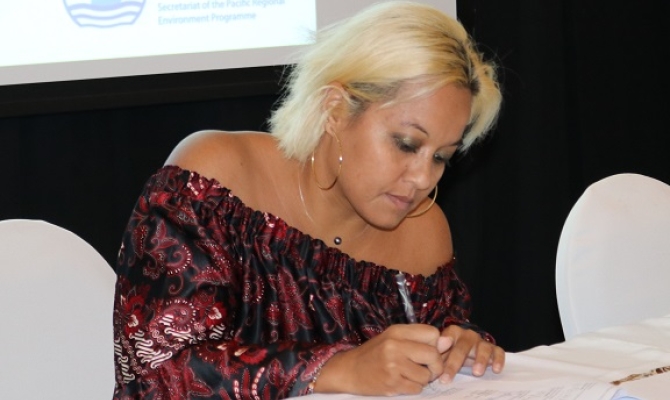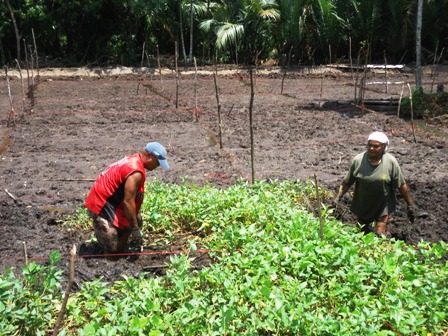
Climate Change Resilience
30 July 2014, Nadi, Fiji - Lowland farms, upland farms, aquaculture and food processing have been four key areas of the Pacific Adaptation to Climate Change Project in Palau with one of the key outcomes being three new strains of salt water resistant taro for the island nation.
The Pacific Adaptation to Climate Change (PACC) Project began in 2009 and ends in December this year. PACC spans 14 Pacific island countries, including Palau, helping their climate change adaptation efforts in one of the three key areas of food security and production, water resource management and coastal protection.
Food security and production has been the main focus of the PACC Palau project after a study undertaken by the Bureau of Agriculture showed that 90% of food in Palau is processed and imported. Further to that, experiencing two typhoons within the space of a year has demonstrated the threat to food security should ships not be able to enter Palau.

"In our lowland farms, we've blended traditional knowledge with modern technologies to improve taro farms using traditional dykes and drainage systems with innovative improvements," said Ms. Madelsar Ngiraingas, the National Coordinator of PACC in Palau.
"These protect the plantations from salt water intrusion and have floodgates to allow for drainage. In Palau everything is pretty much coastal so these dykes help prevent salt water intrusion."
Since 2010 there have been 19 different varieties of taro grown and tested for the best strains that are salt water tolerant. Results indicate three varieties are tolerant to high levels of salinity and are being distributed to different farmers across Palau and the rest of the Pacific.

The PACC project has also helped to strengthen farming in upland areas of Palau.
These areas were not traditionally farmed due to the poor soil quality and their difficulty to access. With soil improvements such as fertiliser and compost, the soil has been enhanced for planting of crops.
Over 10.5 acres of arable farmland have been reclaimed through the Project's adaptation measures, permitting many farmers to return to farming these once abandoned lands in Palau.
Approximately 10 farmers from the two demonstration sites have benefitted from the Project and two state-owned ridge farms will support about 400 people in the two states of Ngatpang and Aimeliik.
The food security and production project in Palau has not limited itself to soil based crops. Aquaculture has also been a key focus of the project, with particular attention on clam and crab hatchery programs. Over the last five years the project has grown seedlings to distribute to farmers to support national efforts of increasing wild stock in Palau.
This year 20,000 crablets have been distributed to 25 farmers from the Palau Aquaculture Cooperative Association with three national training events on aquaculture breeding conducted with over 50 men and women in Palau.

"We've developed effective hatchery farming expertise through this project and found a strong interest in our clam and crab hatcheries. Through our monthly individual consultations with farmers, we have been able to find out what farmers need in terms of breeding and production and how we can best address these," said Ms. Ngiraingas.
Palau PACC approaches food security with multi-sector, multi-agency and multi-state partnerships.
Most recently and perhaps most significantly, partners from the private (Palau Chamber of Commerce), education (Ministry of Education) and health sectors (Bureau of Public Health) have been instrumental in strengthening the food sector.
Aside from the obvious food sector partners, the private, education and health sectors are invested in ensuring local food quality and quantity for the tourism industry, youth and the general public, respectively.
The reputation of the Palau Community College-Cooperative Research Extension, the Palau PACC implementing agency has been able to build on these existing relations to garner support and attention from these sectors.
"We are confident that Palau PACC will have a more positive impact on a wider range of stakeholders with these partnerships," states Ms.Ngiraingas.
There are many achievements made through the many different partners of the Palau PACC project that bring about positive benefits and impacts for the food sector in Palau.
"I think the communities have seen the impact through the support of the Pacific Adaptation to Climate Change Project," said Ms. Ngiraingas.
"We have really made a big difference in terms of increasing production area, allowing farmers to return to their taro plantations, market their goods and become more self sufficient."

PACC is a multi-million dollar activity funded by the Global Environment Facility and the Government of Australia. The United Nations Development Programme (UNDP) is the implementing agency and the Secretariat of the Pacific Regional Environment Programme (SPREP) is the implementing partner, responsible for coordination and overall project management.
The Pacific Adaptation to Climate Change Project countries are Cook Islands, Fiji, Federated States of Micronesia, Marshall Islands, Nauru, Niue, Palau, Papua New Guinea, Samoa, Solomon Islands, Tonga, Tokelau, Vanuatu. The 5th Multipartite Review Meeting of the Pacific Adaptation to Climate Change Projects is held in Nadi, Fiji from 28 July to 1 August.
For more information please contact Mr. Peniamina Leavai at [email protected]
All photos courtesy of PACC Palau
The Pacific Adaptation to Climate Change (PACC) Project began in 2009 and ends in December this year. PACC spans 14 Pacific island countries, including Palau, helping their climate change adaptation efforts in one of the three key areas of food security and production, water resource management and coastal protection.
Food security and production has been the main focus of the PACC Palau project after a study undertaken by the Bureau of Agriculture showed that 90% of food in Palau is processed and imported. Further to that, experiencing two typhoons within the space of a year has demonstrated the threat to food security should ships not be able to enter Palau.

"In our lowland farms, we've blended traditional knowledge with modern technologies to improve taro farms using traditional dykes and drainage systems with innovative improvements," said Ms. Madelsar Ngiraingas, the National Coordinator of PACC in Palau.
"These protect the plantations from salt water intrusion and have floodgates to allow for drainage. In Palau everything is pretty much coastal so these dykes help prevent salt water intrusion."
Since 2010 there have been 19 different varieties of taro grown and tested for the best strains that are salt water tolerant. Results indicate three varieties are tolerant to high levels of salinity and are being distributed to different farmers across Palau and the rest of the Pacific.

The PACC project has also helped to strengthen farming in upland areas of Palau.
These areas were not traditionally farmed due to the poor soil quality and their difficulty to access. With soil improvements such as fertiliser and compost, the soil has been enhanced for planting of crops.
Over 10.5 acres of arable farmland have been reclaimed through the Project's adaptation measures, permitting many farmers to return to farming these once abandoned lands in Palau.
Approximately 10 farmers from the two demonstration sites have benefitted from the Project and two state-owned ridge farms will support about 400 people in the two states of Ngatpang and Aimeliik.
The food security and production project in Palau has not limited itself to soil based crops. Aquaculture has also been a key focus of the project, with particular attention on clam and crab hatchery programs. Over the last five years the project has grown seedlings to distribute to farmers to support national efforts of increasing wild stock in Palau.
This year 20,000 crablets have been distributed to 25 farmers from the Palau Aquaculture Cooperative Association with three national training events on aquaculture breeding conducted with over 50 men and women in Palau.

"We've developed effective hatchery farming expertise through this project and found a strong interest in our clam and crab hatcheries. Through our monthly individual consultations with farmers, we have been able to find out what farmers need in terms of breeding and production and how we can best address these," said Ms. Ngiraingas.
Palau PACC approaches food security with multi-sector, multi-agency and multi-state partnerships.
Most recently and perhaps most significantly, partners from the private (Palau Chamber of Commerce), education (Ministry of Education) and health sectors (Bureau of Public Health) have been instrumental in strengthening the food sector.
Aside from the obvious food sector partners, the private, education and health sectors are invested in ensuring local food quality and quantity for the tourism industry, youth and the general public, respectively.
The reputation of the Palau Community College-Cooperative Research Extension, the Palau PACC implementing agency has been able to build on these existing relations to garner support and attention from these sectors.
"We are confident that Palau PACC will have a more positive impact on a wider range of stakeholders with these partnerships," states Ms.Ngiraingas.
There are many achievements made through the many different partners of the Palau PACC project that bring about positive benefits and impacts for the food sector in Palau.
"I think the communities have seen the impact through the support of the Pacific Adaptation to Climate Change Project," said Ms. Ngiraingas.
"We have really made a big difference in terms of increasing production area, allowing farmers to return to their taro plantations, market their goods and become more self sufficient."

PACC is a multi-million dollar activity funded by the Global Environment Facility and the Government of Australia. The United Nations Development Programme (UNDP) is the implementing agency and the Secretariat of the Pacific Regional Environment Programme (SPREP) is the implementing partner, responsible for coordination and overall project management.
The Pacific Adaptation to Climate Change Project countries are Cook Islands, Fiji, Federated States of Micronesia, Marshall Islands, Nauru, Niue, Palau, Papua New Guinea, Samoa, Solomon Islands, Tonga, Tokelau, Vanuatu. The 5th Multipartite Review Meeting of the Pacific Adaptation to Climate Change Projects is held in Nadi, Fiji from 28 July to 1 August.
For more information please contact Mr. Peniamina Leavai at [email protected]
All photos courtesy of PACC Palau